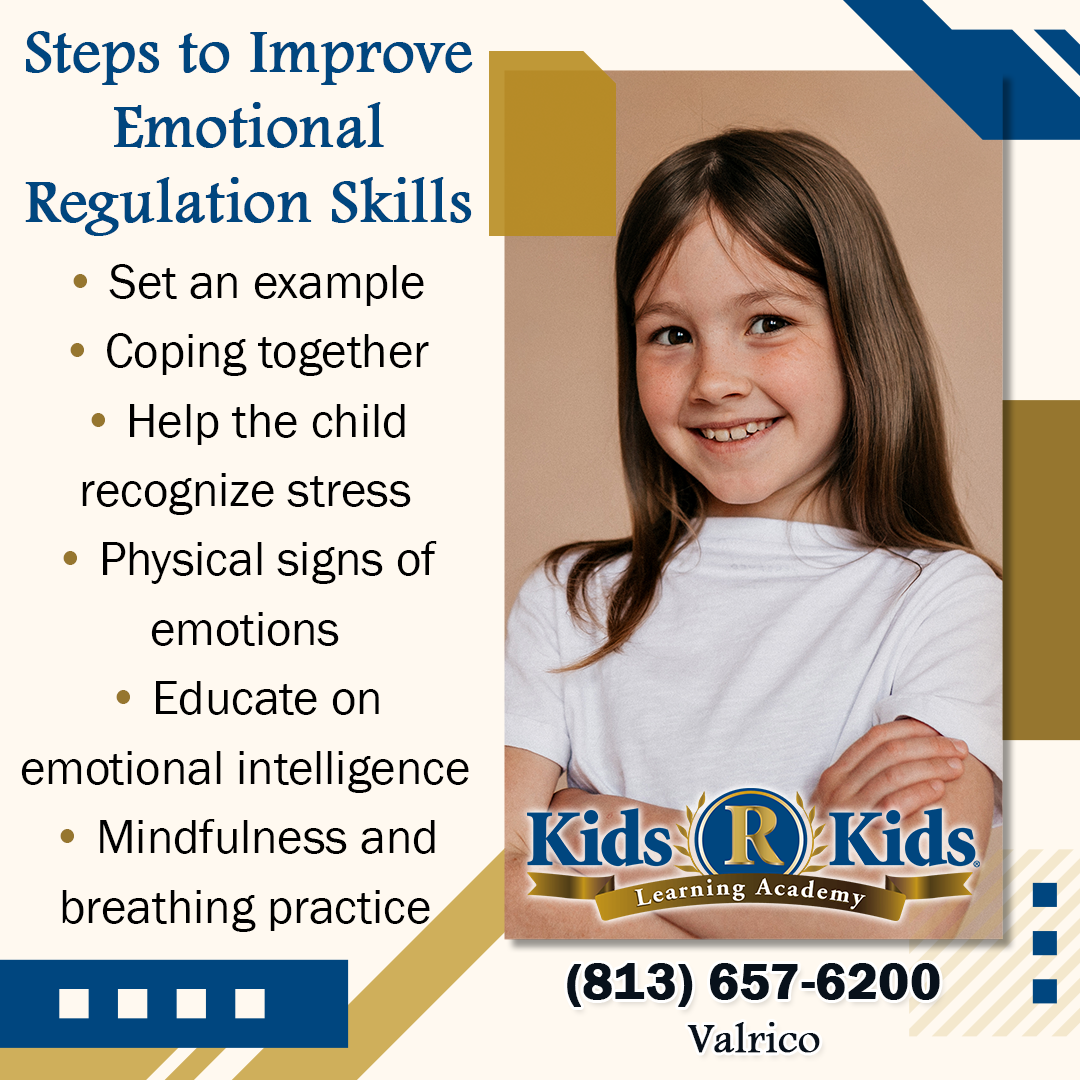Self-regulation skills for preschoolers
According to many studies, self-regulation is necessary for the social-emotional and academic success and well-being of a child. It is one of the most important life skills that parents and teachers must work together to build from an early age. Kids ‘R’ Kids Valrico, an educational preschool, shares below certain tips to help develop self-regulation skills in early childhood.
What is self-regulation?
Self regulation is a person’s ability to manage emotions and behavior as per the demands of the situation. This set of skills enables children to inhibit their emotional or behavioral responses and direct their behavior towards a goal. For instance, controlling the urge to hit another child because their demands are not being met is a skill that needs to be slowly built. The ability to resist highly emotional reactions to upsetting stimuli, to calm oneself down when upset, to adjust to a change in expectations, and to handle frustration without an outburst is an important ingredient to living an emotionally stable and productive life. This skill helps to direct one’s behavior towards a fruitful end despite the unpredictability of the world and one’s feelings.
Steps to improved emotional regulation skills
- Set an example
Children imitate what their caregivers do. So it is important to be a role model when it comes to emotional regulation. The way parents and caregivers handle daily stress is constantly being observed by the little ones. These are life skills and strategies for coping with problems that children start learning at a very young age.
- Help the child recognize stress
Certain situations, environments, and sensations can trigger children and upset them. The reasons could be lack of sleep, hunger, loud noises, crowds, too much screen time, and disruption of routine. Recognizing the reasons that cause excessive stress to a child can help create awareness and empower the child as well as the caregiver by preparing them. Challenging behaviors such as whining, defiance, or emotional meltdowns can be prevented or mitigated if there is clarity on the triggers. This discovery of emotional triggers is also a common anger management activity for kids.
- Physical signs of emotions
Emotional triggers can make children feel “out of control” and cause anxiety in its wake. But teaching a child to recognize their emotions, especially in the way they show up in their body helps to create self-awareness. The way emotions manifest in the body such as sweaty palms, racing heartbeat, and restlessness can be identified and checked before they take over completely.
- Educate on emotional intelligence
Besides identifying the physical signs of certain emotional triggers, it is important to name the emotion. Emotional intelligence is defined as the ability to recognize, understand, and manage one’s emotions and the emotions of others.
An emotional vocabulary goes a long way in helping a child identify emotions and working through them. Visual tools can help children through early elementary ages to learn to manage their emotions.
- Coping together
Once an emotion and its triggers are identified, children need help with discovering healthy and productive outlets for these intense emotions. Every child’s unique nervous and sensory system means that the self-regulation trick would also be unique and will evolve. This requires some trial and error but it is worth exerting this effort. Some children may require physical touch when they are upset while some may resist it. Some children calm down in their own particular space while others need their caregiver’s company.
Generally, young children are physiologically helpless to calm down by themselves. Another effective approach to expanding a child’s emotional regulation skills is to practice co-regulation. This is active participation in helping a child deal with anger and other intense emotions by being present with them.
- Mindfulness and breathing practice
There is an undeniable connection between the body and mind. Besides maintaining consistent routines, mealtimes, and bedtimes as well as building healthy habits, caregivers can teach children the importance of breath. Research proves that deep, mindful breathing can calm the nervous system. Research on mindfulness shows that it strengthens the prefrontal cortex and one’s ability to regulate emotions and behaviors.
Simple mindfulness practices can help maintain a low baseline of emotional arousal in children. This calming strategy can also be used anywhere, anytime to help them manage their emotions and maintain their calm.
Why Kids ‘R’ kids?
The philosophy of “Hug First, Then Teach”, defines every aspect of what Kids ‘R’ Kids, Valrico stands for. Unlike many daycare centers or childcare providers, its methodology is a whole-child approach. It constantly strives to strengthen and encourage every child’s emotional, intellectual, social, and physical well-being through the expertise of its childcare providers and a unique partnership with parents.
Kids ‘R’ Kids International is accredited by AdvancED®, the world’s largest education community, and the Southern Association of Colleges and Schools Council on Accreditation and School Improvement (SACS/CASI). SACS/CASI is an accreditation division of AdvancED®. This accreditation ensures that the high accreditation standards are met and exceeded.

Contact Information:
Kids 'R' Kids Learning Academy of Valrico
4321 Lynx Paw Trail
Valrico, FL 33596
United States
Ben Fernandes
(813) 657-6200
http://www.krkvalrico.com/

